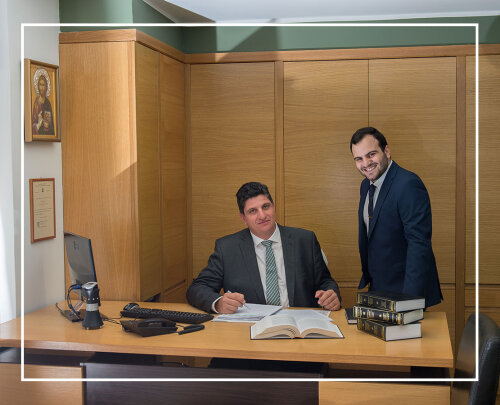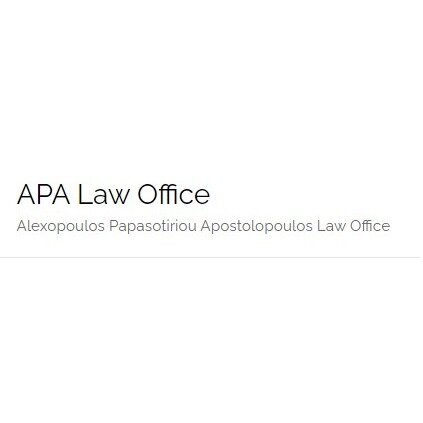Best Faith-Based Law Lawyers in Greece
Share your needs with us, get contacted by law firms.
Free. Takes 2 min.
Or refine your search by selecting a city:
List of the best lawyers in Greece
About Faith-Based Law in Greece
Faith-Based Law in Greece primarily pertains to the legal frameworks that govern religious communities within the country, most notably the Greek Orthodox Church, which is deeply intertwined with the state and societal norms. Greece recognizes the role of various faiths and provides a structured legal framework for religious practice, focusing on preserving religious heritage and rights. Islamic law or Sharia also applies to certain civil matters (notably in family law) for the Muslim minority in Thrace, under specific and constitutionally recognized conditions.
Why You May Need a Lawyer
Individuals might seek legal assistance in Faith-Based Law for various reasons. Common situations include resolving disputes related to religious matrimonial laws, issues regarding inheritance under Sharia law, religious freedom rights, or dealing with state relations concerning property owned by religious bodies. Additionally, those involved in interfaith marriages or conversions may face legal complexities that require expert guidance. A lawyer specializing in Faith-Based Law can provide necessary counsel and representation to navigate these intricate legal landscapes effectively.
Local Laws Overview
The Greek Constitution recognizes the Greek Orthodox Church as the prevailing religion, granting it certain privileges. Religious freedom is protected, and other faith communities can practice freely under the guiding principles of respect and non-discrimination. However, the application of Islamic law in civil matters like marriage and inheritance for Greek Muslims in Thrace is a unique aspect of Greek legal practice, allowing religious courts to handle specific areas traditionally. This illustrates a legal plurality designed to accommodate religious minority rights while respecting national jurisdiction in broader contexts.
Frequently Asked Questions
What is Faith-Based Law in Greece?
Faith-Based Law refers to regulations and legal practices that apply to various religious communities in Greece, especially when governing matters such as marriage, religious freedom, and church-state relations.
Does Greece have Sharia Law?
Yes, Sharia Law is applicable in certain civil matters in the region of Thrace, where a Muslim minority resides. It has jurisdiction over family law issues like marriage and inheritance among the community members, recognized since the Treaty of Lausanne.
What roles do religious courts play in Greece?
Religious courts in Greece, particularly the Mufti courts in Western Thrace, handle specific civil issues for the Muslim minority. Orthodox ecclesiastical courts may address doctrinal and internal church matters.
Do I need a lawyer for interfaith marriage in Greece?
A lawyer can provide essential assistance in interfaith marriages, especially when considering the recognition of the marriage under both civil and religious laws, inheritance rights, and other potential legal challenges.
How does Greek law handle religious conversion?
Conversion between religions is legally permissible in Greece under the protection of religious freedom. However, individuals may still need legal advice to handle civil implications, such as changes in personal documents or status.
What is the relationship between the Greek state and the Orthodox Church?
The Greek Orthodox Church holds a historically privileged position, seen in its role in national ceremonies and formal recognition in the Constitution, though the state's governance remains independent.
Are there legal protections against religious discrimination in Greece?
Yes, Greece has legal frameworks that protect against discrimination based on religion in employment, education, and societal interactions, supported by constitutional guarantees of equality.
What is the impact of Faith-Based Law on religious property disputes?
Religious property laws in Greece may involve complex transactions due to historical ownership by religious organizations, and disputes may require navigation through both civil courts and consultations with religious representatives.
Can Faith-Based Law affect inheritance procedures?
Yes, especially among the Muslim community in Thrace, where inheritance may be handled under Sharia Law, unlike the rest of Greece, where civil law governs inheritance matters.
Are there specific regulations for religious practices in public spaces?
Public practice of religion is generally protected, though subject to general public order and policy restrictions, ensuring practices do not infringe on others' rights or public peace.
Additional Resources
For further information, individuals can consult the Greek Ministry of Education and Religious Affairs, the local Orthodox Metropolis offices, or legal bodies specializing in religious law. The Thrace region's Mufti offices can provide insights into Islamic law applications. The Hellenic Data Protection Authority and the Ombudsman can be resources for addressing discrimination or rights violations.
Next Steps
If you require legal assistance in the field of Faith-Based Law in Greece, it is advisable to first consult with a lawyer specializing in religious law to assess your situation. Law firms with dedicated expertise in international and religious law can be invaluable. Additionally, contacting local religious courts or community legal networks could provide guidance tailored to specific faith practices. It's essential to prepare all relevant documentation and clearly understand your legal needs before seeking counsel.
Lawzana helps you find the best lawyers and law firms in Greece through a curated and pre-screened list of qualified legal professionals. Our platform offers rankings and detailed profiles of attorneys and law firms, allowing you to compare based on practice areas, including Faith-Based Law, experience, and client feedback.
Each profile includes a description of the firm's areas of practice, client reviews, team members and partners, year of establishment, spoken languages, office locations, contact information, social media presence, and any published articles or resources. Most firms on our platform speak English and are experienced in both local and international legal matters.
Get a quote from top-rated law firms in Greece — quickly, securely, and without unnecessary hassle.
Disclaimer:
The information provided on this page is for general informational purposes only and does not constitute legal advice. While we strive to ensure the accuracy and relevance of the content, legal information may change over time, and interpretations of the law can vary. You should always consult with a qualified legal professional for advice specific to your situation.
We disclaim all liability for actions taken or not taken based on the content of this page. If you believe any information is incorrect or outdated, please contact us, and we will review and update it where appropriate.
Browse faith-based law law firms by city in Greece
Refine your search by selecting a city.
















